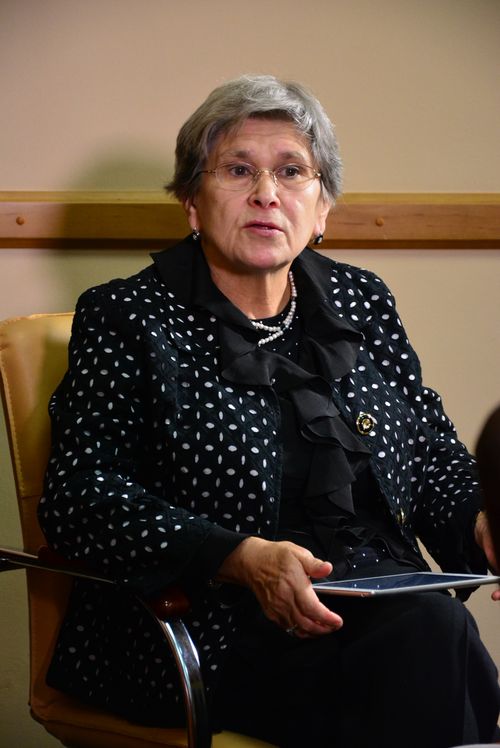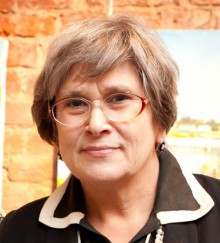Recently, a well-known human rights defender, Andrei Sakharov’s stepdaughter (daughter of Yelena Bonner) Tatiana Yankelevich, who lives in the US, is an opponent of Vladimir Putin’s regime and sincerely supports the independence of Ukraine, was invited to a meeting of an expert council on national security that was created in 2014 on the initiative of the Center for Army, Conversion, and Disarmament Studies. Yankelevich is a fellow for the Cold War studies of the Weatherhead Center for International Affairs and a department member of the Davis Center for Russian and Eurasian Studies at Harvard University.
The purpose of the event was to discuss the prospects and potential of Ukraine in shaping its image in the US and promotion of Ukrainian interests in the media and public sphere, and to assess the risks posed by pro-Russian ideas in the US. During the meeting of the said expert council, it also discussed possible concrete steps and further measures to be taken in cooperation with the American public for the purpose of forming a pro-Ukrainian environment in the US.
“THE U.S. DOES NOT REALLY UNDERSTAND THE IMAGE OF UKRAINE”
In a conversation with Ukrainian experts, Yankelevich said that the US did not really understand the image of Ukraine. People there also do not have a clear idea of the post-Soviet space, except for a small expert community. “After the Maidan, Ukraine has had very little coverage in the media,” she said.
Speaking about associations which the Russian authorities evoke in the US, Yankelevich noted that “everyone has grown used to the idea that Crimea will stay Russian. I do not see any attempts by the US and the West to change this situation, and without strengthening sanctions, nothing will change,” she believes.
“IT IS IMPORTANT TO HAVE CONTACTS IN CONGRESS”
Yankelevich expressed her opinion that, first and foremost, Ukraine needed to involve like-minded people from the post-Soviet space in promoting its image in the US or Europe. “Such people enjoy broad access to European organizations, and they can be very effective in shaping the pro-Ukrainian environment,” she stressed.
However, she also noted: “I am an American citizen, but not everyone will understand that I am very knowledgeable about the situation, and, moreover, some people may think that I am biased, and this can be detrimental to the cause.”
Yankelevich said that she knew no journalists who, having emigrated to the US, were commenting on events in Russia, with the sole exception of Andrei Piontkovsky, who had done so recently.
Therefore, in her opinion, it is important for Ukraine to have contacts in Congress, to find people who can hear and understand it there. She also believes that Ukraine needs to act through agents of influence, organizations such as the National Democratic Institute or the PEN America, as well as through personal contacts.
“UKRAINE HAS EXPERIENCE OF LOBBYING ITS INTERESTS”
Meanwhile, executive vice-president of the Congress of Ethnic Communities of Ukraine Josef Zissels, who was present at the meeting of the expert council, reminded the council that Ukraine had some experience of lobbying its interests in the US.
“In 2005, I participated in a coalition of friends of Ukraine, and this contributed to the repeal of the Jackson-Vanik amendment. I did this together with the then Ukrainian ambassador to the US Oleh Shamshur. I told him back then that we needed to maintain such a coalition,” he said. According to him, at present, the Atlantic Council of the US, which includes former ambassadors of the US and experts specializing in Ukraine, can be counted among friends of Ukraine. Also, Zissels added, we had the experience of mobilizing support from ethnic groups in Europe and America, and American ethnic minorities sending a letter to Barack Obama to ask him to provide lethal weapons to Ukraine is an example of that.
“THE U.S. LACKS AN INTEGRATED FOREIGN POLICY ON UKRAINE AND RUSSIA”
Yankelevich’s assessment of the current government in Washington is of interest as well: “I do not feel that this administration can be relied on. It has lost its bearings, so one should not expect it to have a serious approach to anything. Donald Trump does not have a coherent foreign policy, in particular regarding Russia and the post-Soviet space. In general, I get the impression that Trump is unreliable in every respect. He is an empty suit filled with short slogans. Trump said he had kept his election promise of recognizing Jerusalem as the capital of Israel. I, meanwhile, from the very beginning was skeptical about it ever being 100 percent fulfilled. This is so because his ideas and actions change quickly, because he has no real convictions,” said Yankelevich.
“As far I can see,” she said, “the current secretary of state, Rex Tillerson, is a sound person who has a clear idea of his job and could have directed Trump’s foreign policy if he had any. Unfortunately, the US lacks an integrated foreign policy on Ukraine and Russia.”
After the meeting, The Day asked Yankelevich to tell us about the purpose of her trip to Ukraine and answer a few questions.
“UKRAINIANS ARE DIFFERENT”

Photo by Vlad MASHKIN
“I came to Ukraine to participate in the Sakharov days in Odesa. And I took this opportunity due to Vytautas Magnus University (VMU) of Lithuania having established the Andrei Sakharov Center for Democracy Development. I was invited to open it after Vytautas Magnus University asked for my consent and that of my brother, as we own the name of Sakharov and copyright to works by Sakharov and our mother Bonner. And we gave that consent and received an invitation to open the Sakharov Center, but my brother, unfortunately, could not come. So I came, and they funded my trip to Ukraine.”
How do you remember Andrei Sakharov, what role did he play in your life?
“He played a very unique role in our life. Those were tense, tragic, and at the same time happy years. It was a great honor for us, for my husband and my brother, that we were part of that struggle. We also were part of the struggle to defend Sakharov in his years of exile, extrajudicial and unprecedented isolation, when he was subjected to cruel treatment and violations of all his rights. So, we were part of the Sakharov defense campaign, as I call it, and it was a huge honor for us. As for the personal relationship, we loved and deeply respected Sakharov.”
Why, despite having such a person who could influence popular opinion, Russia did not listen to his opinion, but entered a swamp anyway, as you put it a year ago in a broadcast aired by a Ukrainian TV channel?
At that point, Josef ZISSELS (who accompanied Yankelevich to Radio Liberty’s office) intervened in the interview: “When have such people been listened to in Russia? He was being shut up, prevented from speaking.”
T.Ya.: “It was an aggressive majority that did not want to listen to a different opinion. And I do not know why Russia went that way, into a swamp.”
J.Z.: “Why do you call it a swamp? It [Russia. – Author] was moving down its usual path, that of a revanchist empire. How else could it move?”
Could not they have chosen the path proposed by Sakharov?
J.Z.: “Russia could not move down any other path.”
T.Ya.: “I think it was the inertia of the post-Soviet consciousness or, more precisely, the Soviet consciousness that prevailed as a result of people fearing everything unclear and unusual, fearing freedom. Freedom is a responsibility, and I think that people need to mature to accept it.”
But you said last year that Russia was sliding back to the Joseph Stalin-era Soviet Union.
“I think that the complete return to the Soviet Union and the Stalin era in every respect is not possible. In any case, it will look differently. People simply do not understand that everything is being done in Russia in order to prevent them from understanding history and knowing the truth about it, and real distorters of history are those who accuse of distortion people who try to objectively study it and offer to the younger generation a history written in precise democratic concepts.”
You are right to emphasize the role of history. Even as recently as yesterday [the conversation was recorded on December 15. – Author], Putin said at a press conference: “Russia itself was formed in a complicated way from many Slavic tribes, 16 or 32. In the end, Rus’ was formed, and Kyiv was its part and center. And in this sense, our shared historical, spiritual, and other roots entitle me to saying that we are basically one people.” Why does Putin spread this myth about one people, and why do most Russians share it?
“In fact, this is a philosophical question. And I am not the right person to answer it: I have neither philosophical training nor even a philosophical mind to reason about this subject. History was tragic and cruel, and people went through huge transformations.
“In that way, a new type of Soviet man developed. And it looks like this new type is not ready to accept freedom, rights, and respect for the rights of others.
“Ukrainians are different, and thank God for it. But I think that all the peoples of the former Soviet Union are going through the same processes to a certain extent, only they are at different stages currently, and some of them may be standing still or going back or moving forward very slowly. But this applies not only to the Soviet Union, these processes are the same everywhere, and we could observe this in all countries of the former Socialist camp.”








